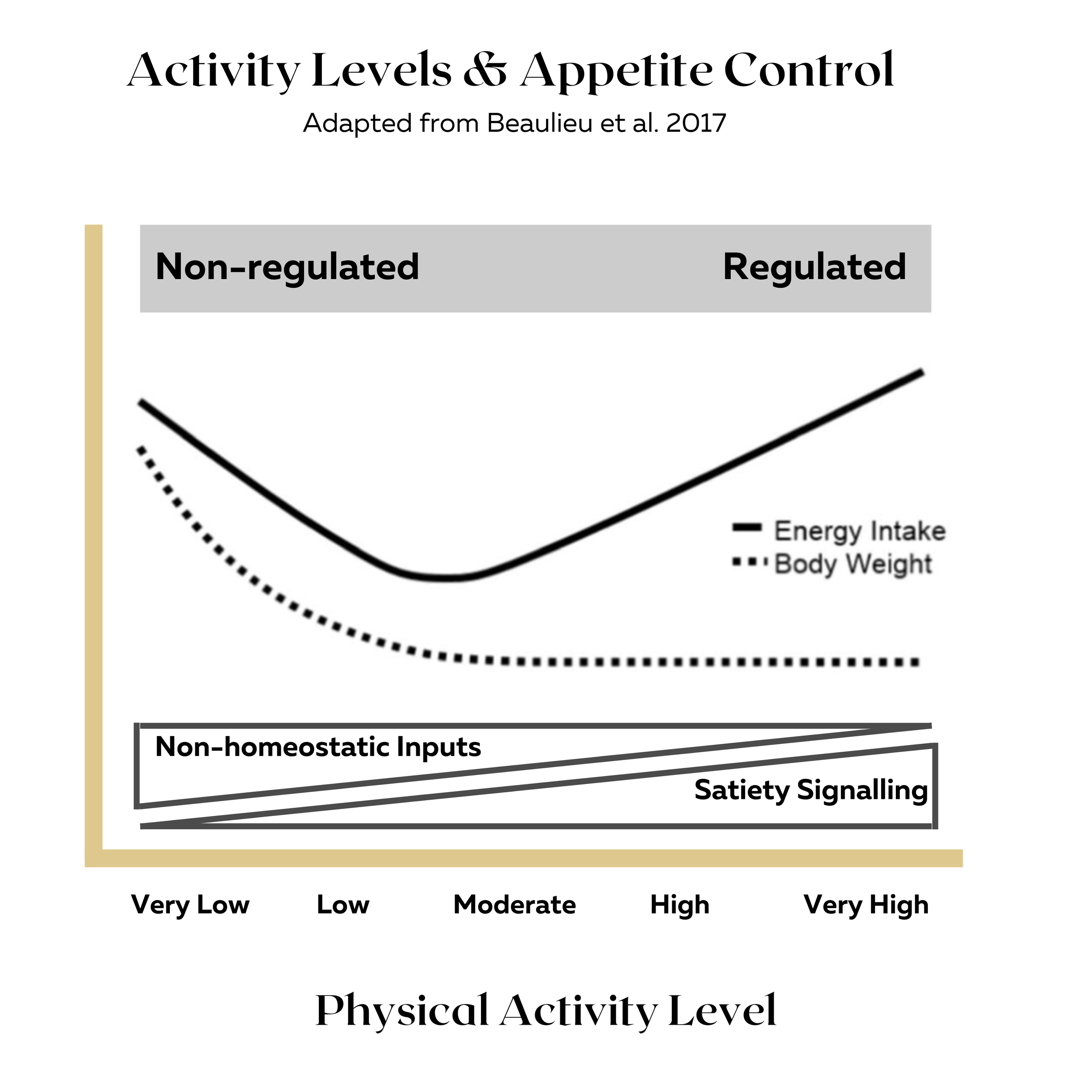Do Higher Levels of Activity Help Regulate Your Appetite?
Exploring one of the underrated benefits of regular physical activity.
Spark Notes:
Exercise is chock full of benefits, but an overlooked one may be that it can help regulate your appetite.
Some research has shown a relationship between activity levels and energy intake to be in a “J” shaped curve where the least active folks seem to eat more than their slightly more active peers.
If you’re aiming to regulate your appetite or body weight then making sure you get enough activity in should be high on your list of priorities.
In an industry full of confusion, ignore the noise and do yourself a favour by implementing the form of exercise you enjoy most into your lifestyle so that you can sustain it indefinitely.
Today I want to talk about a potential secondary benefit of engaging in higher levels of physical activity:
The increased regulation of your appetite
Calories in, Calories out — Yada, Yada, Yada. We know the drill.
As always, I’m less interested in the blunt equation of CICO and more interested in how our lifestyle impacts the variables of energy in vs energy out.
“If you want to lose weight, eat less!”
-People who aren’t helping
Being told to eat less without being given actionable and achievable strategies is equivalent to being told to make more money without having any conceivable plan to follow. In other words, it does nothing to help the situation at hand.
There are countless ways to help mange energy intake and more broadly speaking, energy balance.
Eat more fibrous plant foods that are less calorie dense
Eat more lean protein
Eat less ultra processed foods
Get adequate rest and sleep
Exercise
Etc. Etc.
But one thing that is underrated is actually increasing your general activity. This does not have to mean training more. This can mean walking more or just increasing your overall activity throughout the day.
This can increase your energy expenditure of course, but there is a secondary benefit that often gets overlooked.
Which is the potential increased regulation of your appetite that often comes with higher activity levels.
One paper broke down this topic and talked about what is called the “J’ shaped curve of activity levels and energy intake.
This is from that paper and displays how energy intake tends to actually be higher at very low levels of activity and takes a dip as you increase activity levels until you start to get to moderate-very high levels of activity.
This makes intuitive sense as very sedentary folks won’t necessarily eat more than the most active folks. but relative to their energy needs, they seem to.
On top of this, one other study did show that energy intake did fall within that “J” shaped curve amongst differing activity levels .
It’s also key to point out that it’s not like the least active group were being gluttons — they weren’t. This is common misunderstanding about larger bodied folks.
In this data, they just ate slightly more than group 2 and 3, but they also burned less energy. This would lead to a small energy surplus over time.
This study also did observe the least active group did gain the most fat over 1 year compared to all other groups, gaining an average of 3.74 lbs of fat. Interestingly, all other groups than group 3, did gain a statistically significantamount of fat at the 1 year follow up, but all being below 1.5 lbs of fat gained.
Anecdotally from myself and from working with clients, I do often see that the most sedentary of days seem to have higher energy intakes or what we may call “indulges”. Which was validated by the data where the lowest activity group did score the highest on disinhibition in regards to their eating.
A less regulated appetite does seem to impact eating behaviours, but along with it often comes some added components:
Potential boredom resulting in more eating
Having more access to food than if you were out and being more active
Coping with stress/searching for reward via eating
So if you’re bored at home and lounging on the couch with a dysregulated appetite, you could be walking right into an environment primed for over eating.
Alternatively, if you’ve been sedentary all day while working your ass off, food may be the most convenient and tangible reprieve from the stressful day you’re in.
All of these factors and plenty more could just compound on a dysregulated appetite stemming from less activity.
Which is why once again, physical activity is truly so damn important. It’s value derives from much more than just burning energy. In this case, it does seem to help regulate your overall appetite and if you’re someone who struggles with this, getting your activity in could be even more important.
Practical applications
I’m going to keep this very simple.
Find any form of exercise you really enjoy and find a way to make it a part of your lifestyle indefinitely.
If someone tries to shame you for that type of activity or discredits it, tell’em to kick rocks.
Not enough activity is a general issue for a lot of folks. So making the barriers to exercise more complicated only does a disservice to our global community. This also means that simple activities like walking are great. If that’s all you can manage to do, you shouldn’t feel any shame. It’s far and away better than nothing.
When it comes to getting your movement in, don’t let “decent” or “good” be the enemy of “perfect”.
Go for a walk, do some gardening, tear up the D floor at a Zumba class, lift some weights, whatever.
The key focus is to move in a way that you enjoy so that you do it indefinitely and to not overcomplicate it.
Cheers,
Coach Dylan 🍻
References:
1. Homeostatic and non-homeostatic appetite control along the spectrum of physical activity levels: An updated perspective
https://pubmed.ncbi.nlm.nih.gov/29289613/
2. Low levels of physical activity are associated with dysregulation of energy intake and fat mass gain over 1 year
https://www.ncbi.nlm.nih.gov/pmc/articles/PMC4658461/






